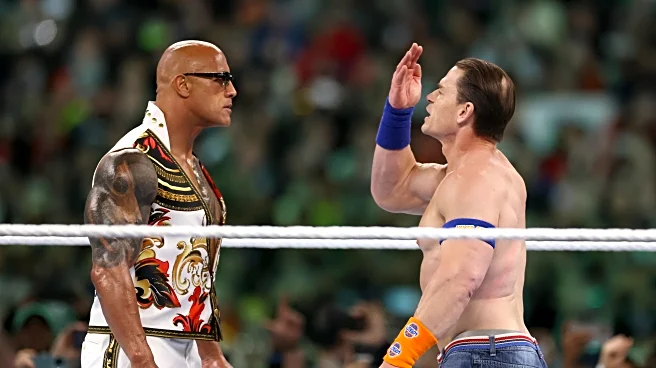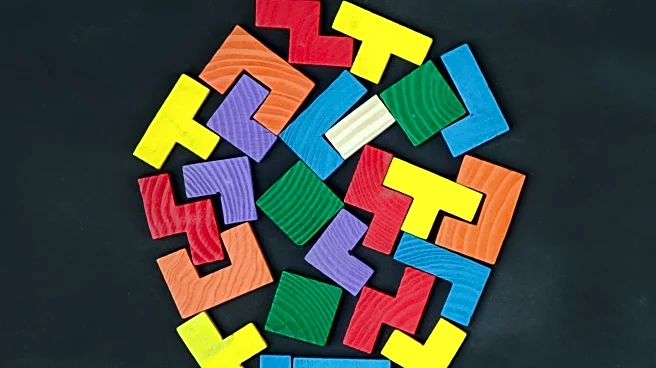Dwayne Johnson’s got at least a couple big money programs waiting for him should he decide to lace up his wrestling boots again, but right now he’s not playing the role of WWE Superstar The Rock. He’s promoting his new biopic on MMA pioneer Mark Kerr, The Smashing Machine — and campaigning for an Oscar nomination after getting a ton of praise for capital-G Going for it with his lead performance.
The Smashing Machine opened everywhere yesterday (Oct. 3), and Johnson, co-star Emily Blunt, and writer/director
Benny Safdie have been on press tours to let people know about a film they’re clearly very proud of. Rock’s tour took him somewhere his movies don’t usually get a of play: as one of Terry Gross’ guests on National Public Radio’s Fresh Air.
As you probably guessed, famed Philadelphia-based interviewer Gross is not a big pro wrestling fan. When Johnson’s extensive history in the business comes up during their roughly 30 minute interview, Fresh Air’s long-time host and producer approaches the subject as a cultural anthropologist of sorts.
For instance, with Ken Shamrock’s MMA background providing a bridge between Johnson’s first career and his new movie, The Rock’s WrestleMania 14 match with Shamrock is a recurring discussion point. He tells Gross he as the result of a bad landing on a belly-to-belly suplex, he was spitting up real blood while doing a scripted stretcher job during that 1998 match.
That leads to…
Terry Gross: Can you explain what suplexing is?
Dwayne Johnson: Sure. So suplex is a wrestling maneuver that started in amateur wrestling. And there’s multiple kinds of suplexes, but basically you would grab your opponent, either lock them around the waist or your face-to-face, or from behind, lock them around the waist, and you lift them up. And drive them down. They’re a maneuver that allow one to dominate a match, whether it be amateur wrestling or professional wrestling, or in
MMA.
It’s not all broken down to that level, but you get the idea.
Anyway, that continues Johnson discussing all the injuries he suffered in college football and pro wrestling, which he uses to transition to his 2013 loss to John Cena. Rock was seriously injured in that WrestleMania 29 match, which led to costly delays on the movie he was set to film. It’s in discussing that DJ sounds gives the impression he’s wrestled his last match.
So much so that he forgot his actual last match, tagging with Roman Reigns on night one of WrestleMania 40 last year (emphasis mine)…
Johnson: I was wrestling John Cena at MetLife Stadium for WrestleMania. And it was for the WWE title. And in that match, I wind up. Tearing my quadricep and my adductor off my pelvis. And when that happened, I knew something was really wrong. I’ve been hurt in the ring a whole bunch of times.
And I remember asking the referee. First, he looked at me. He says, hey, are you okay? I said, I don’t know. I said, I think I’m okay because I was lying on the mat. I just felt something, a few things pop, and that’s what happens. That’s what you feel when something gets popped off your pelvis.
Gross: I’m hurting just hearing this.
Johnson: I said, how much time do we have left in the match? And he said, about 20 minutes. Can you go on? And I said, yes. So we went on, we finished the match. But unfortunately, when something like that happens to your body and you continue to either wrestle your match or play your game or fight your fight, whatever it is, it’s like a chain reaction.
And then everything becomes weak. And when that happened when I tore my quad and my adductor off my pelvis, it made my abdominal wall. Very weak. And then I’d gotten multiple tears in my abdominal wall because I continued the match.
Gross: Why did you say that you could go on when you were pretty sure that something pretty major had happened?
Johnson: Well, I stood up and I tried to walk and I didn’t really have a lot of walking ability, but I knew that my left leg was working really well. My right leg was numb, but nothing was sticking out of my skin. I just felt in that moment, Terry, that I felt like, because the pop was pretty traumatic.
Like I felt it and I thought something was piercing through my skin and I reached down and it was kind of like, I tried to as subtle as I can in front of 80,000 people and to stick my hand in my trunks. And I felt down in that area and nothing was sticking through the skin.
And also your adrenaline is going and there. There’s 80,000 people and they’re there for the main event and they’re there to watch the whole show, but we are the main event. And I trusted John, trusted the universe and the good Lord to give me strength.
Gross: Did John Cena know that you were seriously injured? No. Were you able to convey that to him?
Johnson: I didn’t want to tell him that because I know the moment I tell him, hey, something’s wrong, then knowing him the way I do, because I would do the same thing. He would want to end the match.
Gross: How would he have ended it? Like, how do you do that?
Johnson: He would have said, let’s go home. And in wrestling parlance, when we say to each other in the ring, let’s go home, that means we’re going into the finish, and within a minute, this match will end.
Gross: When you say, let’s go home, is there a way of reverting right to the end and still making it seem convincing?
Johnson: Yeah, so let’s take this for example. In this WrestleMania match, if he would have asked me, hey, are you okay? And I say, no, there’s something wrong. And he says, okay, let’s go home. We would know where to pick up our finishes. So it’s almost like if you go right to the third act of the script, we would go there, and then we would go home, and then that would be the end of the match.
So I didn’t want to tell John that, because I knew the match would end, and I didn’t want the match to end in that way, because not only was it important to me to go out on my shield, also, Terry, I knew this was my very last match of my entire career. My career was going to end on this night. No one knew, but I knew…
And the other reason, and maybe more important than my career ending, was I was doing the honors. So, again, in wrestling parlance, when you’re the world champion and you’re carrying the wrestling business and the company on your shoulders and you do what’s called doing the honors.
That means you are passing it on and you’re passing the Torch to someone who’s going to carry it from here on out. And that was to John. And that was the finish of our match was me giving him me doing the honors for him. And he was beating me in the middle of the ring. One, two, three to become champion. And that’s why I didn’t want the match to end right away. I wanted him to have his moment. That’s important.
We wouldn’t blame Johnson if he didn’t want to get into everything that’s gone on with his character in WWE over the past few years, and breaking down his complex relationship with the Chief Content Officer Paul “Triple H” Levesque is too much for one interview. That would take a whole podcast series.
But file this away for the next time we see The Final Boss on WWE programming… or for your next discussion about if we’ll ever get resolution to that character’s storylines.















